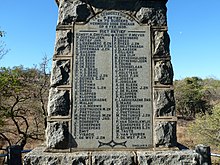Piet Retief Delegation massacre
| Piet Retief Delegation massacre | |
|---|---|
| Part of the Great Trek | |

Monument to the massacre on 'Moordkoppie' (Murder Hill).
|
|
| Location | Hloma mabuto, uMgungundlovu, KwaZulu-Natal, |
| Date | 6 February 1838 |
| Deaths | 100 |
|
Non-fatal injuries
|
Unknown |
| Perpetrators | Impi's of Dingane Zulu |
The Piet Retief Delegation massacre occurred when Voortrekkers under Piet Retief migrated into Natal in 1837 and negotiated a land treaty in February 1838 with the Zulu King Dingane. Upon reconsideration, Dingane doublecrossed the Voortrekkers, killing the delegation of 100 including their leader Piet Retief on 6 February 1838. The land treaty was later found in Piet Retief's possession. It gave the Voortrekkers the land between the Tugela River and Port St. Johns. This event eventually led to the Battle of Blood River and the eventual defeat of Dingane.
Despite warnings, Retief left the Tugela region on 28 January 1838, in the belief that he could negotiate with Dingane for permanent boundaries for the Natal settlement. The deed of cession of the Tugela-Umzimvubu region, although dated 4 February 1838, was signed by Dingane on 6 February 1838, with the two sides recording three witnesses each. Dingane invited Retief's party to witness a special performance by his soldiers, whereupon Dingane ordered his soldiers to capture Retief's party and their coloured servants.
Retief, his son, men, and servants, about 100 people in total, were taken to a nearby ridge, Hlomo amabuto, which means "mustering of the soldiers". The Zulus killed the entire party by clubbing them and killed Retief last, so as to witness the deaths of his comrades. Their bodies were left on the KwaMatiwane hillside to be eaten by vultures and scavengers, as was Dingane's custom with his enemies.
After the Retief Party's death, Dingane directed the attack against the Voortrekker laagers of Bloukrans, which plunged the Great Trek into temporary disarray and in total 534 men, women and children were killed in what became known as the Weenen massacre.
Piet Retief's death and the Weenen massacre eventually led to the decisive Voortrekker victory at Blood River, after which Andries Pretorius and his "victory commando" recovered the remains of the Retief party. They buried them on 21 December 1838.
...
Wikipedia
